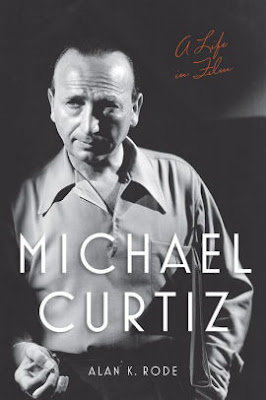William Wellman, Jr.
The best thing about this loving, but clear-eyed biography of director Wellman, by his namesake and one of his seven children, is that it is exciting from the first page. The nickname Wild Bill was apt. From his eventful childhood and peril-filled World War I pilot days to his long, magnificent career as one of the most successful film directors of the studio age, the filmmaker never had a dull moment in his life and despite caring little what people thought of him, he made more friends than enemies. He helmed an astonishing number of classic films, including Wings (1927), The Public Enemy (1931), A Star is Born (1937), and the Ox-Bow Incident (1942). Wellman also gave a break to a wide array of talent, with Ida Lupino, Rosalind Russell, Robert Mitchum, Timothy Carey, and Clint Eastwood among the young, hungry actors in which he saw star power. He appreciated his actors and crew and always stood up for him. While he had a bad habit of using his fists to deal with conflict and frustration, he’d often use that fury in their defense. His is an epic story, told here with a personal touch and the added insight of those who knew him.
The Brief, Madcap Life of Kay Kendall
Eve Golden
Kay Kendall is probably best known to American audiences for her breathlessly chaotic performance in The Reluctant Debutante (1958) and a scene-stealing turn in Les Girls (1957). She would not live long after making those films, succumbing to leukemia in 1959. Her thirty-two years of life were astonishingly robust and packed with activity as if she knew her time was limited. Eve Golden taps into the endless energy and determination of this woman who needed very little time to make a lasting impression. It’s a bit like reading the script of a screwball comedy, with the notable exception of a tragic death scene. Still, the overall tone here is cheerful, reflecting a woman who would never dream of sitting still or indulging in self-pity. A great tribute to a uniquely charismatic talent.
Eve Golden
The story of Polish-stage sensation Anna Held is remarkable because it both reveals a dramatically different time and the way fame has remained in many ways the same over the years. Golden’s exploration of the way rumor and promotional gimmicks both helped and hindered Held brings to mind many a scandal from the age of the Internet. Many film fans know Held from Luise Rainer’s Oscar-winning performance in The Great Ziegfeld (1936). As mesmerizing as Rainer was, Held was a much more substantial person, who balanced her knack for drawing adoring crowds with professional savvy, emotional wisdom, and a generosity of spirit, which she showed especially in the World War I years as she bravely traveled to frontlines to perform for French soldiers. She kept an eye on trends and did her best to advance with the times, as much as her core act was of a particular era. That intelligence is very much behind the success her common-law husband Florenz Ziegfeld had as an innovative stage pioneer. Golden gives the actress her proper due as a chief influencer in the way Ziegfeld dramatically changed stage entertainment.
Michael Curtiz
Alan K. Rode
It seems that plenty of people respected Michael Curtiz’ technical skill as a filmmaker, but no one liked him. At best the insensitive and crude director had the respect of his co-workers. These personality defects are only part of the fascinating aspects of a life story that covers a phenomenal career spanning silent films in Europe to the early years of sixties Hollywood. Curtiz is most celebrated for Casablanca (1942), and for good reason, but I most enjoy the movies he made in the pre-code era and the tales of their production are just as lively as the end result.
Many thanks to University Press of Kentucky for providing copies of the books for review.





No comments:
Post a Comment